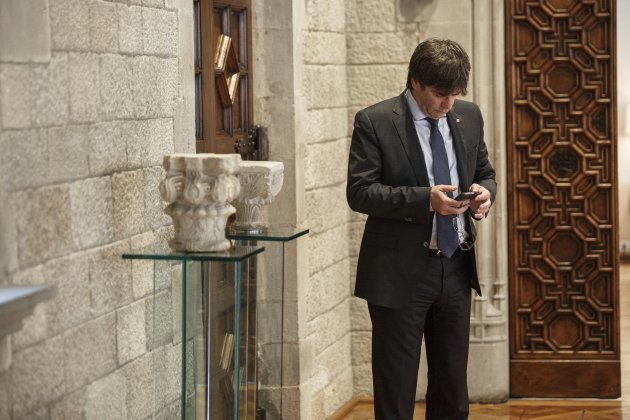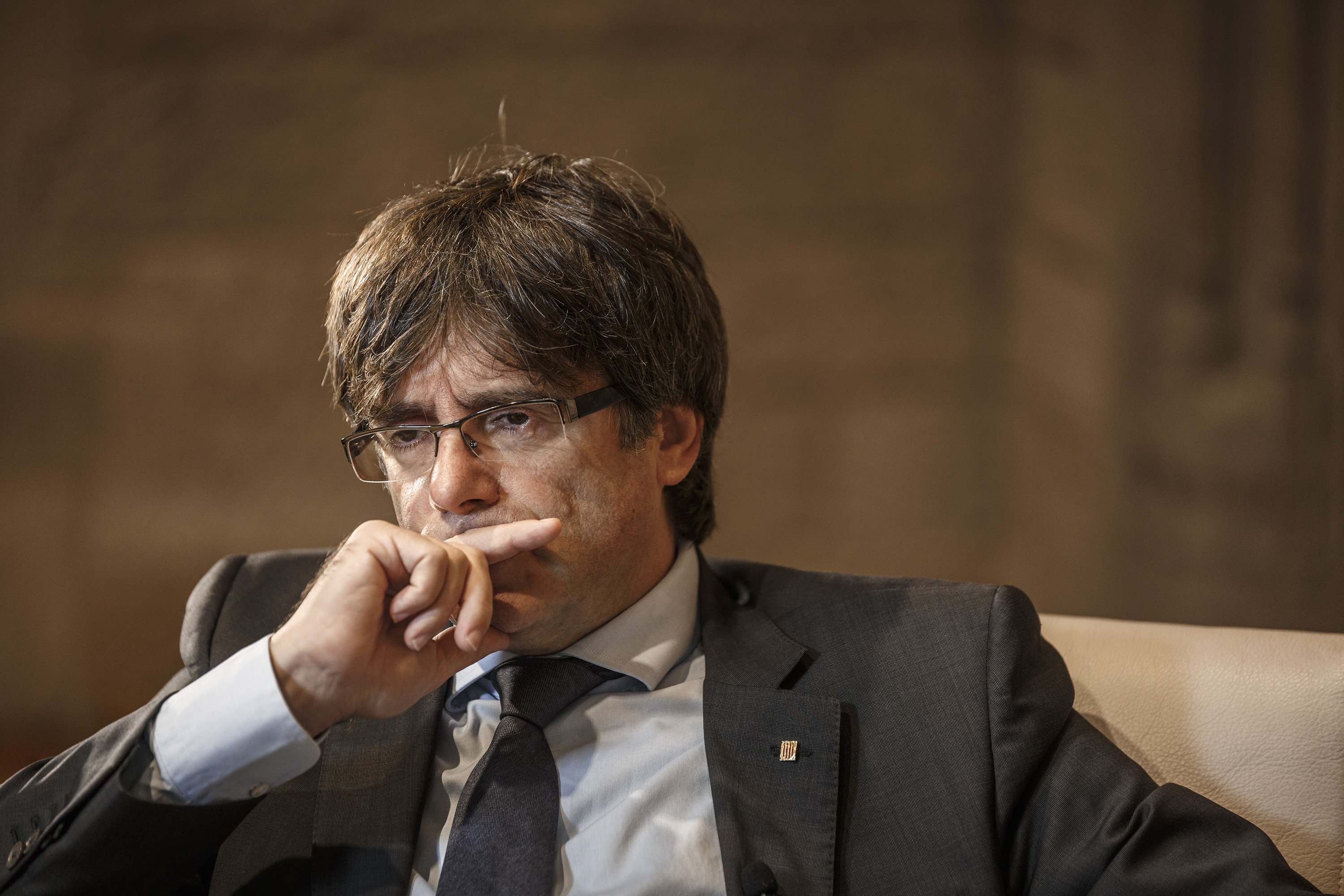Carles Puigdemont receives El Nacional in the Montserrat hall of the palace of the Catalan government, which acts as an anteroom to his office. The brutal jihadi attacks in Barcelona and Cambrils of 17th August have precipitated the start of a decisive political course. The tension of these days is perceived in his serious gestures, and in the very measured answers. The moment is very delicate. The president is angry at the attempts that have been made - and are being made - of mixing the attack with the independence process and discrediting the work of the Mossos (Catalan police), who managed to take down the terrorist cell in four days. He warns that the terrorists will not be able to alter the normality. And, within it, the independence referendum of 1st October: "We are determinated to self-determine," he says.
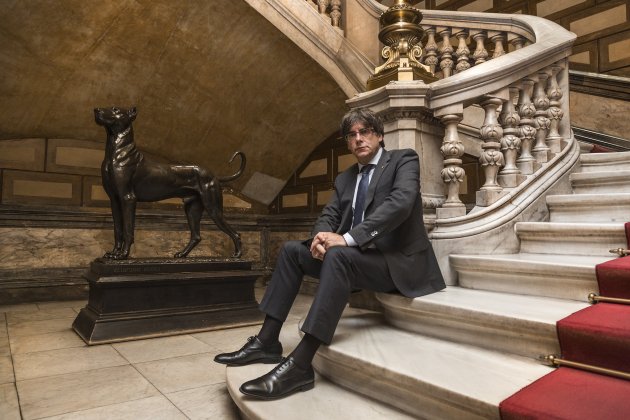
How have you lived these days since the moment of the attacks in Barcelona and Cambrils?
With some feelings, in plural, conflicting, contradictory, the same ones I believe, that most people have experienced. On one side, worry, frustration, rage, pain and immense sorrow, which still lasts. But at the same time, also determination, courage, hope, confidence and faith in society, because effectively, we have shown signs of this confidence, determination, civil unity, to defeat terrorism and to accompany those that suffer its effects. This mixture of feelings, with alot of speed, alot of pressure, alot of responsibility, from the moment I received the first piece of news, until right now.
Who gave you the first piece of news?
My team. A flash alert. And, immediately, I set off. Because, although the information was zero, after immediately calling the minister of Interior, I was given some more details. I was on my way towards Barcelona when prime minister Rajoy called me.
So, was Rajoy one of the first people you talked to?
Yes, very soon. And we have been in contact these days, and the communication has been direct and fluid.
From the first moment, Rajoy called and put himself at our disposal and we exchanged information
Has you felt accompanied, however, by the Spanish government? At some point you've been asked this during the past days and you haven't fully replied...
We have done everything we had to do in our area of responsibility. Also with very good coordination and cooperation. We have accompanied one another mutually. Otherwise, we might not have been able to manage together a crisis of this magnitude and dimension that surpasses any other, with the degree of seriousness and serenity that we have been able to do. From the first moment, Rajoy called and put himself at our disposal and we exchanged information. As in other former crises this was not the case, that of Freginals [where 13 students died in a coach accident in 2016], for example, was not his way, but this time it was and one has to acknowledge it.
However, Rajoy took a long time to meet you within the framework of the crisis committee activated by the government ...
It is true, but in these moments, after these very difficult and very hard days, we must not confuse who the real enemy is in the fight against terrorism: they are the terrorists. The time will pass that needs to pass so that in a very serene and distanced manner we can take stock of where we did well, of what we didn't do so well, of where it is necessary to improve, and to deepen the coordination of where I believe that we have performed correctly. From this point of view, nothing good would come from opening a front of reproaches. On behalf of the Catalan government, we believe that we do not have to that. If anybody wants to do it, it is a mistake. In the fight against terrorism, we are many who think very differently and we are on the same side.
We have demonstrated that we are prepared for any eventuality and that we manage our responsibilities to the utmost level and under any circumstances
In any case, the action of the Mossos has been very effective, the terrorist cell has been neutralized in four days. The foreign press has spoken about Catalonia having acted like a self-sufficient state...
The will has not been to act on the margins of anybody. On the contrary, with sovereign cooperation with everyone. What have we shown via the facts? That we are prepared for any eventuality, and that the responsibilities that correspond to us to manage, in this case in application of the Statute, we manage those responsibilities to the utmost level and under any circumstances. We are prepared. And that we can respond to challenges that have overwhelmed some states, and that we want to do it without closing the door to cooperation with anyone. On the contrary, we want to add to the efforts of the civilized world to combine efforts and resources to cope with this threat. That someone from outside has realised what we were already convinced about internally will also help us, and will help many people to understand that when we speak of a modern state we're not referring to flags and passports and those things that characterize states of the 19th and 20th centuries, but we refer to this: what police force we are talking about, the nearest police, who are effective, who are well prepared, who communicate well. Through the facts, many people notice what we are referring to when we say "a better state".
But also with an under-funded police force, and it was announced the need to incorporate 500 new agents this year, it has put spokes in the wheels on behalf of the state's government ...
It is true that we have been under-funded, unrecognised for many years, having to assume our institutional responsibility as a police force under conditions that are not the best. We also say that, despite this, the police are doing very good work. Even before the sad attacks, the police of Catalonia had a very high degree of appreciation on behalf of the citizens. Obviously, if this can help us, finally, to stop having to fight so much for what is obvious, that we have a staff underpaid what is necessary, and that a much more routine and fluid system of meetings with technical commissions to exchange information, of security council meetings, and that it is necessary for the Mossos to be present in those international organisations of police coordination ... all this I believe, after what has happened, is more visible. I want to see effects in the coming weeks that this is the case.
What has happened makes it more visible that the Mossos must be present in the international organisations of police coordination
There has been concealment by the Spanish police of key elements, information on the imam of Ripoll has been hidden ...
Once we have attended to all the victims and done all the police work well, we will have to see where there could have been some error. I want to believe that within the framework of the relationships that we usually have with other bodies and security forces of the state and intelligence services, that sensitive information flows. If it has gone as it is being explained by the press, then we will have to look at what has happened exactly, as it would not have been good practice. However, I insist, we have to be careful. That the Mossos did not have police information about the imam is true, and has already been said, now: was there exact information that linked him to terrorist activities? We do not know this.
And that American intelligence services had warned that an attack on the Rambla was being prepared?
Periodically, information appears, like the warnings in a video of Al Qaeda or Daesh that there are targets, such as the Sagrada Familia. Faced with these facts, the police have always, always acted. It is obvious, however, that we do not have an intelligence agency. Our intelligence agency at this moment is the C.N.I [the Spanish intelligence service] and with whom it relates is with other intelligence agencies. All the information that comes to us is through these channels. But, in any case, we do not have a relationship with the CIA.
We maintain the referendum because the normality is the defeat of the terrorists
President: in a month, a referendum on self-determination in Catalonia will be convened. What will change - if anything changes - and what not, after the attacks?
Of the attacks we have often said, with great insistence, that the purpose of the terrorists is to try and change our model of life, of society, that is based on democracy, freedom, diversity and respect, and this will not change. That the political agenda, which has nothing to do with the security policy, should undergo some substantial alteration for the purpose and interest of terrorists, I believe would be a mistake. There is no element that leads us to it, but the contrary: we maintain normality to the utmost. Because the normality is the defeat. We want to defeat the terrorists. The exercise of freedom is always a victory. We are democrats and democracy defeats totalitarianism. The violent expression of the terrorists seeks to end freedom, it wants us to have fear, to shut ourselves at home, as we'd have enemies on the other side of the door, so we would not be able to move with freedom. We, as a government, and I'm convinced that the majority of the population shares it, cannot allow that to happen. Therefore, from this point of view we must have the calmness and the serenity that the government governs in all areas. We have to maintain the good functioning of the country.
That somebody mixes agendas to take political advantage of a tragedy, offends me as a human being. I find it miserable, besides false
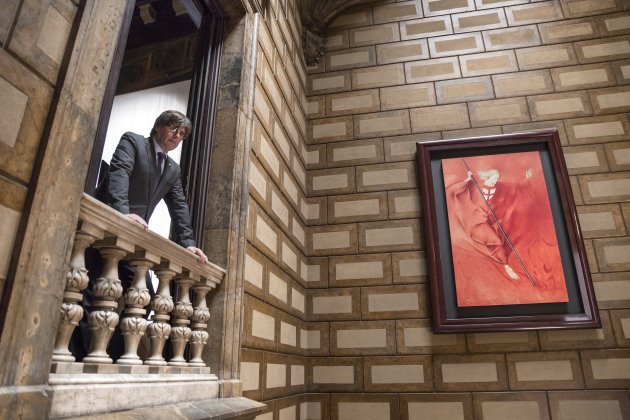
There have been attempts by the state to link one thing to another: the attack and the independence process. You yourself have stated that it annoys you ...
That after demonstrating that we have the capacity and the will to manage things to the maximum of our responsibility, to mix one thing with the other not only annoys me, it is offensive to the victims. This is a government that has been dedicated in body and soul since the first minute to manage properly the police, medical and social fronts that a crisis of this magnitude entails. We have mobilised everyone, without exception, we have given ourselves up, and the citizens have witnessed the result of all this work. That someone comes and tries to take partisan or political advantage of a tragedy, offends me as a human being, as a person, not as a politician who thinks in a specific way. I found it miserable, because it was, besides being false. I have been very careful, and that's why I believe that wanting to mix agendas is not honest.
The people have to be sure that when we convene the referendum, this referendum will be held without fail
At any rate, with the demonstration over, Catalonia will restore its political agenda again, and will restore normality again. Is everything under review in the calendar, of what will happen from today until 1st October, and how everything will be done?
We have the obligation to have everything planned, because we could hardly call a referendum if we did not have it resolved. A long time ago I said that the referendum will be convened when all guarantees are available to make it possible and that is what we have to dedicate ourselves to. The people have to be sure that when we convene the referendum, this referendum will be held without fail.
Are there guarantees, right now?
We have them and we keep on having them. There is a basic guarantee that is the law.
When will the Law of the Referendum be approved?
Well, this is an area of work of the Catalan Parliament, but obviously it has to be approved in a timely mnner and so that the formal referendum can proceed with all the guarantees required that have to accompany the celebration of the referendum.
The government's purpose is to make the referendum possible and commit ourselves in the implementation of the result
Will the Law of Transitional Jurisprudence be approved before the referendum?
This is a matter for the parliamentary groups to decide. The intention of the government is to make the referendum possible, which is our purpose, and commit ourselves to the implementation of the result, whatever it is.
It will be you convening the referendum ... ?
The government will convene it ...
Before the Diada [11th September]?
This question cannot be answered because it has a lot to with the parliamentary calendar. We do not have the law yet. I cannot foresee an exact referendum date if we do not have the law. When we have the law, we will make the call.
Will the call be the same day that the law is approved?
In any case, it cannot be before. It has to be after the approval of the law, and after approval is when the law comes into force.
The decree of convocation - how many days beforehand does it need to be signed? The 9-N was signed a month before...
Yes, but that of the 9-N served for the 9-N. We will make the decree in the terms that is marked by the law.
The Law of the Referendum does not mark any deadline ...
The decree will be protected under the Law of the Referendum.
Although you don't tell us, is the calendar agreed on?
Since 29th September [of 2016], which was the question of confidence, we already had a certain calendar.
We ask because the pressure from the members of the CUP, about whether the Law of Transitional Jurisprudence has to be approved before or after, gives the sensation that the calendar is not as closed as it would seem.
Who has to close it, the organisational part, and of the celebration and implementation of the result is the government, and the CUP is not only not in the government, it is in the opposition. This is a matter of the government. Even if we have parliamentary alliances in a specific area, in the opposition groups in Parliament, the government will assume its responsibility.
Is the CUP pressurising alot?
To me? No. It pushes me in the same way as other parliamentary groups. They all take a stance. Everyone wants to push things in their direction. But the government is the government. And it has the widest majority in Parliament. Therefore, on that rests the activity and also the serenity of the government.
But who guarantees the independence majority is the CUP...
Effectively, but who guarantees the government is Junts pel Sí (Together for Yes) ...
... and they ask for very specific things, for example, such as the minister Vila leaving the Government ...
And what exactly does that have to do with the referendum?
It has to do with the CUP being the parliamentary group that supports the government proceeding with this road map ...
This is part of the characteristic performance of opposition groups. Whoever decides to appoint and dismiss ministers, as has been proven, is the president. The CUP or any other parliamentary group, with all respect, have the right to think what they want, but it is obviously the president who appoints the ministers and ratifies them in the post. Santi Vila, and all the rest, whatever the CUP says, are full members of this satisfied government.
Marta Pascal, the PDeCAT general coordinator, has said that from 2nd October they will not want anything more to do with the CUP...
If what we are saying is that between the world we represent ourselves and that of the CUP there is a great ideological distance, it is true. Sometimes it seems funny when I see published in some media that the CUP is about to enter into the government, as if we have so much in common ... our space has always been characterized by a great ease in sharing space with those who think differently. For me this is an indispensable recipe for the politics of the future.
We can guarantee absolutely that on 1st October there will be ballot boxes
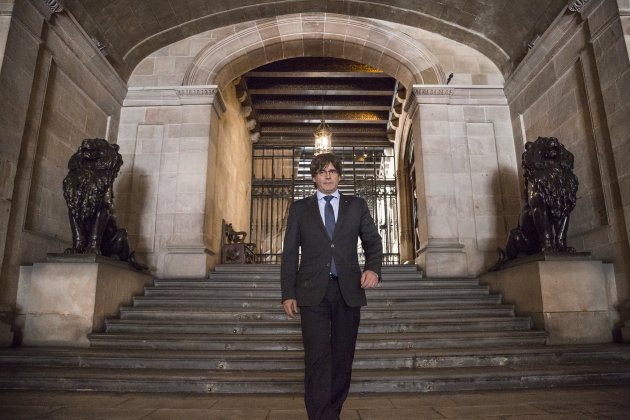
You explained to the Financial Times that you already have more than 6,000 ballot boxes. How have they been bought?
I cannot give more details for obvious reasons. If you ask me if on 1st October we can guarantee that there will be ballot boxes, then I have to reply that yes, absolutely. And this is the work to which the government is dedicated, as all governments that have been in Spanish democracy have worried when they call an election or a referendum, that ballot boxes will be there. The difference is that nobody ever asked them what administrative mechanism they used to achieve it, and they ask it to us. But we will do what all the other governments of the Spanish democracy have done: guarantee that on the day that the electoral colleges are open, people can go along.
Is this issue already resolved, then?
If not, we would not call the referendum.
The issue of ballot boxes is resolved, otherwise we would not call the referendum
Where are they, these ballot boxes?
I insist: what I am saying is that when we sign the convocation of the referendum, we will be signing a contract of guarantees that we have to give to the people, yes or yes.
Will the census [polling] card be received at home as in any other vote?
This will be explained at the time, once we have passed the Law of the Referendum. Everything to do with the formal operation of the referendum will be used by this law and the government will follow what says the law.
The Spanish prime minister says that there will not be a referendum ...
But he's not the one calling it, nor has he announced it, nor is he organising it! I announced it, and we are the ones organising it. Therefore we are the ones you have to look towards to know if there will be a referendum or not. I understand what prime minister Rajoy says, but the responsibility of making it is ours.
It is necessary to choose between contributing to the normality or altering it with 1st Oct. I make a calm call to everyone to contribute to the celebration of the referendum with absolute normality
The state will move all possible resources to prevent it. There is talk of article 155 of the Constitution (suspension of the autonomy), pursuit of personal assets ... what is it that worries you most?
I am worried that we can celebrate the referendum in a climate of normality and out of respect for the people who want to go and vote - to vote yes, no, or blank - and for the people who decide not to go there. This is the government's concern with respect to the referendum, everything else is an accessory. And that we would ask for is that anyone who it is a participant in all this, either close by or from further away, that they contribute to this normality. It is necessary to choose between contributing to the normality or altering it with 1st October. The normality is what brings us closer to the exercise of democracy and freedom, and therefore I make a calm call to everyone to contribute to the celebration of the referendum with absolute normality.
We are about forty days from the referendum, and we carry this on our back for many years. Does anyone think that on this final stretch, now is the time to back down or say no?
Does the response from the state not worry you then?
It would be absurd to say no. We know that the state can pull many strings and resources. But in the order of concerns it does not occupy the first place. The first place is occupied by the referendum. Doing it well. Achieving it with full normality, so that anyone who wants can exercise their right to decide, their right to vote, with all freedom. The government has the duty to protect everybody. This is the maximum concern. If, in order to guarantee this, there are consequences, what will be necessary to start with is that those who have provoked them to explain exactly what was intended by provoking any effect to prevent a referendum. Attempting to prevent the democracy? It will have to be explained very well, whoever wants to do it. But the conviction is that there is so much desire to decide, so much desire to vote, to make this point in this process to start a new stage, that it is impossible to stop the will of people who want to vote. We as a government are simply a means through which this will has to be channeled. If they think that attacking the means they will stop the will of the people from exercising their right to decide, then they make a mistake, and they should already know it. We are about forty days from the referendum, and we carry this on our back for many years. We have made many things and we have arrived here. Does anyone think that with this final stretch, now is the time to back down or say no? We have thought it through very well! Now: that we would have liked to have done it in under other conditions, is true. It would have been preferable if we had been able to agree it with the state.
If the scene now changed radically and you received a call from prime minister Rajoy to speak ...
If he wants to talk, I have always said that you should try to talk at any moment, without doubt. If prime minister Rajoy is interested in talking, the doors are open. And if I have to go to Madrid, I'll go to Madrid, but at this moment I do not believe that this is on any table.
If the state decides to agree on the referendum, we cannot say no to changing the date
In any case, if this dialogue took place, it could mean stopping or postponing the referendum?
If the will of the Spanish government is to make it possible for the Catalans to vote and to agree on the terms to be able to make the referendum, it is obvious. If the first option was a referendum agreed with the state and the state decides to agree on the referendum, I think we have the duty to seek this path. We cannot say: now no. If there is a will to do so, if we can agree on the terms in which we will celebrate the referendum and manage unanimously everything that will represent the transition if 'yes' wins, or what it would represent if 'no' won, it would be the scenario that the majority of the Catalans want.
These last days, not strictly during the attack, have you received any message from the government of the state? Has there been any gesture? Any movement to explore a road?
No.
Nobody? Nothing? Not even indirect messages?
No.
The state has the highest responsibility in the situation in Catalonia, and has not done its duties. It has been inhibiting and this is a sign of a great irresponsibility
And during these days of the attack, has anybody made a comment?
No, and I believe that it did probably didn't correspond, either. They've been moments of concentrating on the victims and of pursuing the terrorists. It would have been a little decorous and not sensitive if someone had attempted to say: 'Let's talk, what do you think if we do this ... ’ I honestly believe that it did not correspond and I have not reproached them for not having done so. Now: I believe that the Spanish state has a great responsibility, too, it has the highest responsibility in the situation, and to date it has not done its duties. It has inhibited the situation that is being lived in Catalonia and this is a sign of a great irresponsibility. It is a political affair that exists, which is not a lie. These days we have seen that the people here are serious people, who can discuss issues from very different positions in a very civilized way, even if we have very great political differences. Therefore [the Spanish government] has to make politics. Refusing to do politics in the face of a political problem, I believe that is not responsible.
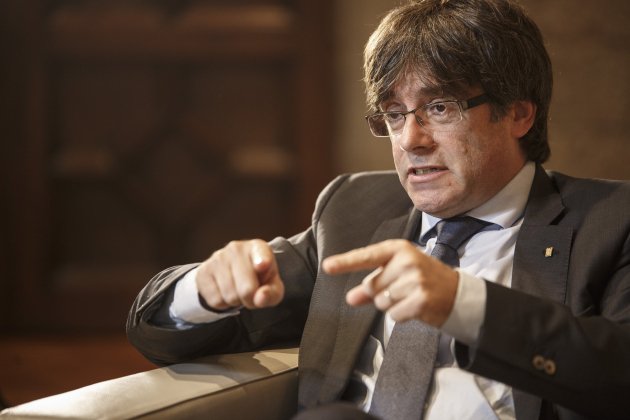
On 1st October many people will go out to vote and we will be responsible for what we have to do the next day
What do you think will happen on 1st October, therefore?
There will be many people who will vote and it will send us a message. We will be responsible for what we have to do the next day.
What will the City Council of Barcelona do?
You will have to ask the City Council of Barcelona. But I am absolutely convinced that the citizens of Barcelona who have the right to vote will be able to vote in Barcelona in the referendum of 1st October.
If there is no break in normality, the participation will be very high
President, suppose that 'yes' wins but that the participation does not reach 50%. In this scenario, is independence equally proclaimed, as announced, within 48 hours after the proclamation of the result?
It depends on the circumstances. We believe that a very extraordinary mobilisation of the voting base naturally favours us. And I am convinced that if there is no breaking in normality, the participation produced will be very high. If we are in a scenario of breaking the normality, the participation will be different...perhaps we will be talking about other issues. Before you asked me what worries me. I am worried that it can be celebrated with normality and, therefore, that many people can go out to vote. This is the objective of the government.
What is the scenario of breaking the normality?
An alteration of the rules of the game on behalf of the Spanish government, an abrupt and inexplicable irruption in the area of our powers ... many ingredients, it is not one alone, that they can alter the normality, but not the will of making the referendum.
If the Constitutional Court prevents you legally from doing anything, and if this happens before 1st October, then you will reach a point where you will have to disobey the court to have the referendum ...
We have to obey the law of the Catalan Parliament that will be approved.
But they will have to disobey the Spanish law.
The concept of disobedience is wrong. Who introduced it, which was not Junts pel Sí (Together for Yes), was wrong. Because we have never proposed a subject of disobedience but of explicit obedience to Parliament. This is very serious, because we believe in the rule of law, but always, in a system of democracy and liberties, which are what allow legislations, the Constitutions always come from the will of the people, and this is what gives us this strength and this determination of obedience to Parliament. This is where we have to respond and trust the strength of our position. Not what others will do.
Managing a democratic political conflict with arrests is unmanageable. I believe it is not a scenario to be contemplated.
However, they can arrest you for not complying with Spanish law ...
This would be a very abrupt alteration of normality, very inexplicable for the other side. I believe, without wanting to put water in the wine, that this will not happen. Because managing a democratic political conflict such as this, with arrests, is unmanageable. Internally and externally. I believe it is not a scenario to be contemplated.
Disqualification?
Disqualifications come after a judicial process, which obviously has its course. In October there is no room for disqualification. There may be the application of the reformed article for a single reading and urgent reading - I would like to remind you that the Spanish Parliament reformed the organic law of the TC (Constitutional Court) for a single reading and urgent procedure to enable the court to suspend posts elected, which the Venice commission responded to in a very hard way. Here is an explicit contradiction with the Statute of Catalonia, which is another organic law approved by a referendum, that sets the conditions for which the president of the Catalan government can be suspended from office. And it does not appear that the TC can take this decision. Therefore this is a suspension that does not affect me. I do not feel concerned by a suspension issued by the TC that goes beyond what the Statute establishes.
I am not concerned by a suspension issued by the TC that goes beyond what the Statute establishes
In any case, once the law is approved and the decree is signed, the call will not stop whatever the decision of the state government?
It will not stop. Our commitment to celebrate the referendum of self-determination is absolute. We are determined to self-determine ourselves.
Our commitment to celebrate the referendum is absolute and the state will not stop it. We are determined to self-determine ourselves
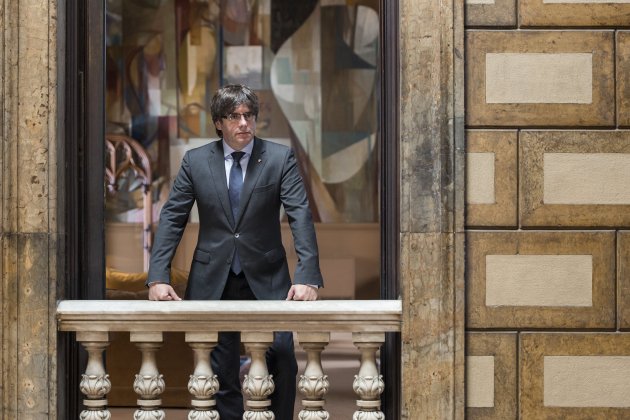
Where do you see yourself in a year?
Second fortnight of August? Finishing a very peaceful vacation with my family, calmly, free from responsibilities ...
What Catalonia will we have in that moment?
What the citizens will have chosen. We may have held autonomous elections, if 'no' wins. And it could be that we are already reconciling the transition towards constituency elections, to be able to have the referendum approve the Constitution of the new Catalan Republic. Both scenarios are possible.
The transition to independence has to be short, with alot of dialogue and very well negotiated, but short
How much time will the transition take? What will you propose to Rajoy?
It will also depend on the circumstances. If we had agreed on the referendum with the Spanish state, this would also have been one of the terms of the agreement, but in not agreeing it, the transition will be determined by the results, by the reactions from outside, by the reaction of the Spanish political system faced with the results ... All of us would like, I believe in the interest of all, that if 'yes' wins the referendum, a short transition period, very well discussed and very negotiated, but short. And if there are aspects that require being worked on with alot of calm, then they should be worked on in tripartite commissions, with the EU, the Spanish state, Catalonia. But that we keep doing it, we keep on going.
On 2nd October, whatever happens, whatever the result, things will have changed alot. And the position of the Spanish state will become untenable
What makes you think the prime minister of the Spanish government will accept this path?
One thing is desire, another is the reality. At any rate, I believe that on the 2nd October, whatever happens, whatever the result, things will have changed alot. And that the position of the Spanish state will become untenable, whatever the result. The Spanish state, its political system, will have to make decisions about how to position itself before that new stage..
Is the government absolutely armoured after the last crisis?
It has always been armoured. This goes for the previous executive as the one right now. We would not have arrived here if it was not armoured. We would not be 40 days from the referendum with the solidity of the position that we have, and managing a complex and difficult daily routine.
And the PDeCAT?
It is armoured since its birth. It was born armoured. It could not be any other way.
Being able to celebrate 1st October with the greatest possible normality. This is the great conquest of the government. The result is secondary
What worries you most?
Being able to celebrate 1st October with the greatest possible normality. This is the great conquest of the government. More that the result. In fact, a yes or a non-sovereign, both are a victory. A non-sovereign is a victory. For the Government, the result is secondary. What is important is the referendum, how we celebrate it, that the people feel absolutely calm and guaranteed. This is the maximum concern about the referendum. There is not another. And we are dedicated to this.
